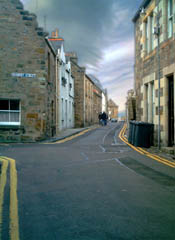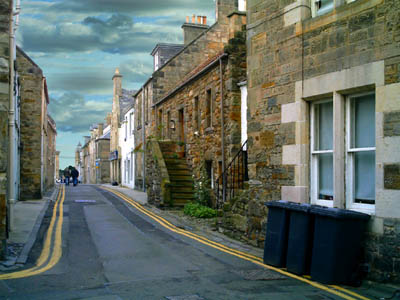Poetry in Motion
 The rumour was unconfirmed, but excitement was mounting. Translator and respected national poet, Alastair Reid, was going to burn ‘Scotland’. For years, apparently, he had tensed his shoulders when the iconic poem was mentioned in conversation. For the last five days, when a series of text and images based on the poem were projected huge and stately on walls around St Andrews, he had lowered his gaze and hurried past. ‘Scotland’ was like a millstone around his neck. ‘We’ll pay for it’ he had written. He was paying for it now.
The rumour was unconfirmed, but excitement was mounting. Translator and respected national poet, Alastair Reid, was going to burn ‘Scotland’. For years, apparently, he had tensed his shoulders when the iconic poem was mentioned in conversation. For the last five days, when a series of text and images based on the poem were projected huge and stately on walls around St Andrews, he had lowered his gaze and hurried past. ‘Scotland’ was like a millstone around his neck. ‘We’ll pay for it’ he had written. He was paying for it now.
I don’t pretend to understand the complexity – or even the truth – of the situation. I had a passing familiarity with Reid’s work and a small ear dipped to the ground on search of information. I knew that his poem had captured the intense frustration and bitterness of a nation. Now, with Scotland encased in a modern armour of steel and glass and ‘award-winning’ architecture, the nation’s feelings were ambivalent. The slick planes of modernity tried to slide off centuries of historical rage. The Executive attempted to exercise power and exorcise centuries of political marginalisation. But that might not have been it at all. One rumour, at least, suggested that Reid had written the poem in fifteen minutes and could not understand all the fuss.
In any case, he was to be the main attraction at a marathon reading session, the 100 Poets Gathering. Poets from the UK and beyond were to read at one of the largest ever such gatherings in Scotland. The programme said ‘don’t miss this historic occasion’. As I read this I realised I was just about to. The time was five past four and the event was to finish at half past. This was to my experience of St Andrews, a growing sense of familiarity with individual buildings, an inexact knowledge of the overall street plan and the time being at least half an hour later than I expected.
I marched with vigour from the modern Byre theatre to the more functional Golf Hotel Function Room. History was being made and all I could experience was the swift passing of time on an ancient high street. I arrived early, in time to see the first members of the audience, lively and talkative, leaving the venue. They too had been caught up in the over-fast flow. ‘Scotland’ had been consigned to its fate, read for the last time almost certainly. But conflagrated? Perhaps it had burnt particularly quickly, helped by oxygen from all those grim centuries? In any case, I had missed it.
For me, ‘Scotland’ will be forever on the cusp of burning.
Later in the evening Reid stood in for Jorie Graham, Pulitzer Prize winning poet and Professor of Rhetoric and Oratory at Harvard. On doctor’s orders and at short notice, she had been advised against flying. Reid, bless him, would read instead. He had left his latest poems in Edinburgh, not knowing of this unexpected obligation, but extracted an old pamphlet When Now is Not Now and began. No, he did not read ‘Scotland’, although as I subsequently discovered, it was the third poem in the collection: a squat, taunt structure of thirteen lines. Instead, he proceeded in rough order, earning a round of applause for his idiosyncratic tale of bibliographic subversion: ‘The O-Filler’. A man (‘imagine!’) was filling in O’s across the library table from Reid, who watched with growing envy: ‘had I accomplished/Anything as firm as he had, or as fruitful?’
Reid was followed in the second half by the headline act, Mark Strand, former Poet Laureate and former Chancellor of the Academy of American poets. He was a tall man with a straight back and an avuncular voice: ‘soporific’ my friend suggested, ‘don’t you mean mesmerising?’ snapped a nearby fan. ‘No,’ he replied, thoughtfully. In any case, although Reid’s delivery proved surprisingly contentious, Strand himself provided the real intrigue: ‘you must not’ he said firmly, ‘think that any of these poems are biographical.’ What a firebrand to throw to a group of creative people with over-active imaginations. Even when Strand was reading a poem about a man and a camel I indulged wild imaginings about his life. ‘I have never lived in the desert’ he said, as if sensing speculation. I was enthused to see that Strand had a marked proclivity for animals. He wrote about dogs, including a poet-dog called Spot, and horses and camels. I have always been intrigued by animal mimicry, and Strand’s poems were a valuable addition to the small canon of work about animals that are not nauseating. Strand also wrote about many other things, including a man in an elevator who wished only to go down and did so in the sense that he moved downwards to the second, repeated verse. A tight blend of form and content: a good example for higher students who find such statements difficult. It was a pleasant evening, sitting legs crossed in the spacious town hall as the temperature plummeted. Scotland moved as far away from burning heat as it was possible to go without entering an ice age: truly, a day of extremes.
It amused me that people spoke of the good weather. Perhaps this was because I had a wholly unrealistic belief that St Andrews, on the last day of the tenth anniversary of StAnza, would be blessed with a blue sky. I must have read the words of a previous critic about the festival, ‘poetry seeps from the very stones’ and decided that for such a thing to occur conditions must be optimal. In practical terms, it is impossible to appreciate seeping poetry if you are freezing and dying to wrap your hands round an ugly plastic cup of so-so coffee. Perhaps I simply don’t have a poetic soul? You could tell there was a festival happening: groups of people drifted, ambled and eddied, clutching distinctive blue and white programmes, talking about poems or, more frequently, discussing the private lives of poets (oh horror). The hub was the Byre theatre, a place of clean lines, light space and dark auditoriums. Tickets were sold, events chosen and food consumed: conversations were begun, interrupted and restarted. 
The only event I made it to in the Byre was the intriguingly titled: Poetry & Dance: Love in Bilingual Motion, Four dancers, a video-jockey and lighting effects. This was in partnership with Ars Poetica, Bratislava, and the British Council, Slovakia. As I entered the performance space, at the top of the theatre, I was aware of the weight of expectation. Countries, not just companies, had ratified this event. It was to be multi-media and supremely modern. I was not experienced in watching dance, let alone judging the talent of disk jockeys. Open-minded, I slouched comfortably and became aware of a bold, wiry man lurking near my right shoulder. He was one of four performers and the only man. Love seemed far away, although twinning arrived early when two female performers danced together. It all it was a strange performance, moving at times, sometimes humorous, occasionally erotic (or pornographic for the tone was uncomfortable). The graphics were basic and the music veered from classical to café culture droning. Foreign poets’ voices were mellifluous: the British poet’s voice was ugly and patronising. For two o’clock in the afternoon it was challenging. At one point the man next to me fell asleep and his wife prodded him. Their subplot made me smile: it was a face of love that I recognised.
Although St Andrews is a university town, it did seem that the average age of the audience for StAnza events was about fifty: baby boomers with an appreciation of culture and the patience to make it to the East of Scotland. I had tried and failed to persuade three young people to come from Edinburgh so I was inclined to admire the commitment of anyone who had made it. Young volunteers added a dash of youth, but not quite enough to quell the uncomfortable feeling I get when someone mentions ‘vagina’ and I am surrounded by nicely dressed, older people. My token demographic survey may be inaccurate, so this paragraph is to be approached – as most surveys should be – with some scepticism.
The last night party began with style. A Balkan style band struck a folksy beat and some of the most gifted poets of our generation got on with the serious task of consuming beer and looking, in a few cases, rather lonely. I left early. It was a fairly long drive back, snow was falling and my car music system was broken. Poetry oscillated softly in my mind as snow speeded towards the windscreen.
© Hannah Adcock
Photographs courtesy of Macieklew/Morguefile

Comments